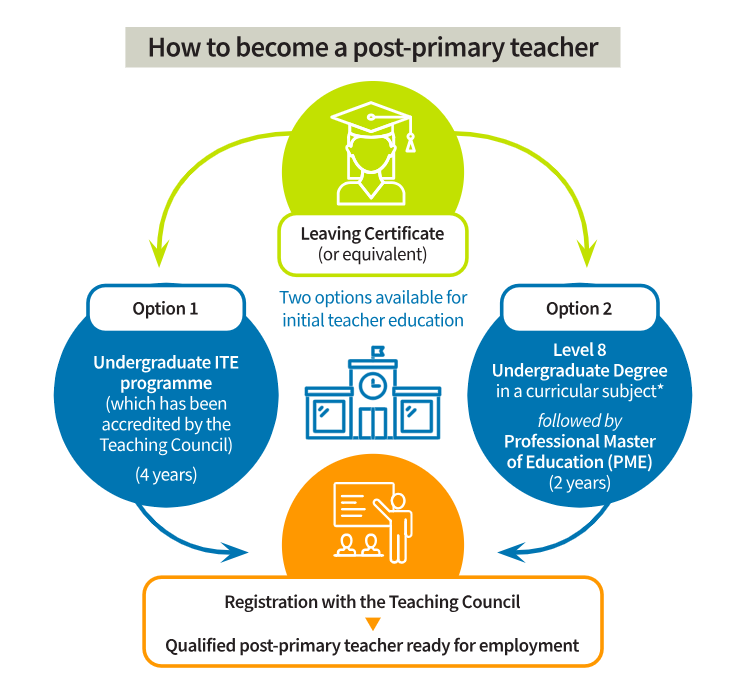In the realm of education, the path to inspiring minds and shaping futures often takes unexpected turns.
For those who begin their journey as Special Needs Assistants (SNAs), the question arises: Can an SNA become a teacher?
In Ireland, there are different routes and requirements for Primary School teaching and Post-Primary (Secondary) School Teaching, so make sure to familiarise yourself with these depending on what you hope to achieve. A great place to learn about this is the website of the Teaching Council of Ireland.
To become a primary teacher in Ireland, you must complete a programme of initial teacher education (ITE).
There are two options to choose from:
The first option is to complete an undergraduate ITE programme. This takes four years.
The second option is to complete a postgraduate degree, called the Professional Master of Education (PME). This takes two years. You can apply for the PME during the final year of your Level 8 undergraduate degree, or when you’ve completed your Level 8 degree.

This helpful infographic is from teachingcouncil.ie
To become a post-primary teacher in Ireland you also must complete a programme of initial teacher education (ITE).
On completion of your undergraduate ITE programme or the PME, you will be eligible to register as a post-primary teacher with the Teaching Council.
Note: There is no requirement for competence in the Irish language, unless you wish to become a post-primary teacher of Irish, or work in an Irish-medium school.
The graphic below shows the two most common pathways which lead to registration with the Teaching Council.

This helpful infographic is from teachingcouncil.ie
*Prior to entry to the PME (post-primary) you must have satisfied the requirements for at least one curricular subject as outlined in the Curricular Subject Requirements.
Let's delve into the possibilities and opportunities that exist for SNAs seeking to transform their roles and impact in the dynamic field of education.
1. Recognising Transferable Skills:
Special Needs Assistants play a crucial role in supporting students with diverse learning needs. The skills acquired in this role, such as empathy, patience, and adaptability, are inherently transferable to a teaching career. SNAs often develop a deep understanding of individual student requirements, forming a solid foundation for the complexities of a teaching role.
2. Pursuing Further Education:
To transition from an SNA to a teacher, pursuing additional education is a key step. Many SNAs choose to enrol in teacher training programs, such as the Professional Master of Education (PME), to acquire the pedagogical knowledge and methodologies essential for leading a classroom. These programs provide a structured pathway for SNAs to expand their skill set and qualify for teaching positions. To gain entry to a PME you will need to hold a degree, such as a BA (Hons) in Inclusive Education Practice.
3. Gaining Classroom Experience:
While in the role of an SNA, individuals can actively seek opportunities to engage in teaching activities under the guidance of qualified educators. Collaborating on lesson planning, assisting with classroom management, and participating in extracurricular activities offer valuable insights into the multifaceted responsibilities of a teacher.
4. Embracing Professional Development:
Continuous professional development is a cornerstone of a successful transition. SNAs can attend workshops, seminars, and conferences to stay abreast of educational trends, teaching methodologies, and inclusive practices. This commitment to ongoing learning enhances the prospects of a seamless shift into a teaching role.
5. Networking within the Educational Community:
Building connections with educators, school administrators, and other professionals in the education sector is instrumental. Networking provides opportunities for mentorship, guidance, and exposure to the broader educational landscape. Engaging in professional communities fosters a sense of belonging and support during the transition process.
6. Showcasing Leadership Skills:
Aspiring teachers can demonstrate their leadership potential by taking on additional responsibilities within the school community. Initiatives such as coordinating events, participating in curriculum development, or leading extracurricular activities highlight an SNA's capacity to assume a more prominent role in education.
7. Irish Requirements for Primary School Teaching in Ireland: If you wish to transition from an SNA to a primary school teacher in Ireland, there is a general requirement that includes a H3 in Leaving Certificate Irish. There are programmes that facilitate gaining your Irish language qualification.
In the transformative journey from being a Special Needs Assistant to becoming a teacher, the possibilities are promising and fulfilling.
The unique experiences gained as an SNA, coupled with a commitment to education, create a solid foundation for success in the teaching profession.
With the right blend of further education, practical experience, and a passion for fostering learning environments, the transition is not just conceivable but an empowering evolution towards leadership in education.
For those with aspirations to guide and inspire, the pathway from support to teaching awaits, promising a profound and rewarding career in the world of academia.
If you are interested in SNA qualifications, a BA (Hons) Inclusive Education Practice degree that lead to teaching opportunities or post-graduate routes to teaching with a PGCEi, you can book a consultation call with our expert course advisor Sarah Coyne email sarah.coyne@portobelloinstitute.com or call 01 892 0028.
Get Insider Updates: Join Now!
Join our mailing list to receive the latest insights and exclusive content from your chosen department of interest



.png?width=1200&name=Feature%20image%20(67).png)
.png?width=352&name=Untitled%20design%20(22).png)
.png?width=352&name=Michelles%20Blog%20Feature%20Images%20(39).png)